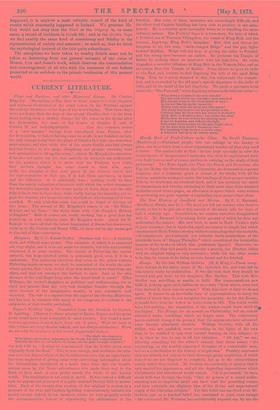TALES OF THE TEUTONIC LA.NDS. - * Tales of the Teutonic Lands.
By George W. Cox, M.A., and Eustaee Hinton Jones. London: Longraans• 1872. THE collection of stories now offered to us by Messrs. Cox and Jones is the promised sequel to the "Popular Romances of the Middle Ages" edited by them a year before. Those who took pleasure in the former tales will find here set forth with no less skill legends which were dear to the fathers of ourselves and our kindred peoples in old days, and to which we are now turning again after long neglect ; the Icelandic saga of the Voleunga, and the later German form of the same history in the Nibelung lay ; the prowess of Sigurd and Siegfried, the love and the vengeance of Gudrun and Kriemhild ; the might of Grettir the strong man of Iceland, and the high-minded friendship and undeserved fates of Gunnar and Njal. The contents of this book have for the anost part, indeed, been already brought within the reach of Englishmen by the help of Mr. Dasent, Mr. Magntisson, and Mr. Morris. But they had not yet been put together in such a moderate compass as to catch readers whom, for want of leisure or special aptitude, the more complete and elaborate versions may at first fail to attract. The Volsunga Saga and Grettis Saga of _Magnusson and Morris would together make a book considerably larger than the whole of this collection. And though the real devotees of ancient song and story will always prefer to go to a whole and unabridged rendering, there is quite reason enough to justify a more compendious treatment, which will in no way interfere with fuller knowledge, and may indeed lead to its being sought. We presume, of course,. that Mr. Jones has worked on the common originals, independently of the pre- decessors we have mentioned. Considering how very recently their editions have been produced, and how much coincidence was unavoidable in going over the same ground, it would perhaps have been as well to guard against any misapprehension by some explicit statement on this head. Mr. Cox quotes one or two passages from Mr. Morris's Volsunga ,S'aga in the preface, taking it for granted, we suppose, that the reader will know whence he is quoting. But 4liwe cannot help regretting that a writer who takes so much interest in the work of making Aryan mythology better known has missed I the opportunity thus given him of offering some tribute of sym- pathy and recognition to what Mr. Morris and his colleague have done in this behalf.
As to the Nibelungenlied, however, we do not know that any accessible English version exists. Here much greater condensa- tion naturally had to be effected than in any other part of the book. Mr. Jones has accordingly suppressed episodes and cut down events which fill whole cantos in the German lay into a few lines ; yet when he deals with the important incidents, he contrives to give them fully enough to preserve the interest, and to follow the language of the old singer pretty closely. In the passages where we do find arbitrary variations, we confess that we do not much like them. It may have been thought that the simplicity of the ballad style would seem meagre in this abridged form, and that some extra colouring was required ; but we would rather have seen "the original more nearly adhered to, even at the cost, if need were, of substituting a series of extracts for a continuous narration. The central event of Siegfried's death certainly suffers by the compression of its telling. His dying words are reduced to a few lines, in which he is made, without warrant of the German text, to curse his murderers and their off- spring. What he does say in the song has a pathetic grandeur which is frittered away in abridgment. A rough prose version of a few stanzas may partially show the true character of the scene :— "'By this deed [says Siegfried] is shame brought on all flesh that shall henceforth be born of woman. Ye have wrought your vengeance on my body with all too grievous -harm : in scorn must ye live apart
from all good warriors.' Likewise the King of the Burgundians bemoaned his death : then spake the deadly wounded man: There is no cause for him to wail over harm who has himself brought it about. Him men may well blame sorely ; better had it been left alone.' Then spike the stern Hagen: I know not for what ye mourn : now is there an end to all that misliked us ; now be there few of them that dare withstand us : I count it well that I have this day rid us of this mighty man."
The unmoved exultation of Hagen over the crime, in con- trast to the remorse of the others, is also left out as Mr. Jones tells it. Before we leave Siegfried, we must point to one touch which goes to confirm Mr. Cox's remark that the framework of all these legends is too repugnant to Aryan morality to have originated in history, or even anything intended for human history. Immediately after telling how Hagen, whom Siegfried still thought his sure friend, gave him the treacherous death- stroke in the one place where he could be wounded, as Hagen had by guile learnt from Kriemhild, the singer says :—
" Nay, such deeds of shame are done by no warrior at this day."
We are inclined to wish that the editors had seen their way to omitting one or two of the minor stories, so as to make room for a more developed treatment of the Nibelungenlied. The legend of Walter of Aquitaine, for instance, is very well told by Mr. Cox, but (in his own phrase) it is only the older epic watered down. The student of comparative mythology may find it interesting enough to watch the process, but the result is a decidedly inferior story, which should claim a place only on the terms of leaving ample way for its elders and betters.
Probably the Icelandic tales which occupy the latter part of this volume will be the most popular. They give a lively picture of a state of society wonderfully unlike that which we now live in, and yet containing the germs of it. We find a very rude code of morals, but we also find that as far as it goes it is respected and enforced. The reverence for even-handed justice, and the sense of the equality of all men before the law, to which the Teutonic races owe so much of their success in the world, appear as already well developed. The law is made by the whole people assembled, FLA it is made to this day in some of the Swiss Cantons; but the Althing, which makes the law, also adinin- istera it, the legislative and judicial functions being still unsepa- rated. Notwithstanding the popular constitution of the Court, there is a plentiful growth of precedents and legal subtleties. Thus when the suit was brought for the murder of Njal, the defendant's counsel first challenged the neighbours who were summoned on the inquest, and then got the judgment set aside on the ground of the suit having been brought in the wrong Court :— " And other suits being brought on for the Barning. Eyjolf brought every trick and quibble of law to boar on Flosi's behalf, so that those also fell to the ground. Yet still new suits went dragging on from court to court on different issues until it came to this —the great wrong of the Burning had long ceased to be matter of dispute, and the only quibble that was wrangled over at the Altinne was whether one of two lawyers, Mord or Eyjolf, was guilty of contempt of court."
It is true that in this case the parties lost patience, and there was a free fight at the Althing. The moral is that simplicity and speed of procedure, and the preference of substantial justice to formalities, are the virtues not of primitive, but of modern law. Mr. Cox does not attempt to apply any of his mythological chemistry to the story of Burnt Njal. Indeed, he has chosen it by way of an example to show where comparative mythology is willing to stop. We cannot agree, however, in the broad dis- tinction he makes between the Grettis Saga and the other Icelandic tales. He says it "has few or no distinctive features, and can scarcely be regarded as in any sense a record of incidents in Icelandiclife." No doubt many of the particular incidents must be unhistorical, and there may well be considerable mythical elements in the story as we have it; nay, even in Burnt Njal the quarrel between the wives of Njal and Gunnar may not be free from reminiscences of Brynhild and Kriemhild But the story of Grettir is certainly as full of true local colour and character as any of the others ; and if we cannot tell how far it is a record of any individual events which actually
happened, it is anyhow a most valuable record of the kind of events which constantly happened in Iceland. We presume Mr. Cox would not deny that the Iliad or the odyssey is, in some sense, a record of incidents in Greek life ; and in the Grettis Saga we find exactly the same kind of consistency and fidelity in the representation of society and manners ; so much BO, that we think the mythological interest of the tale quite subordinate.
The exceptions we have taken to sundry details must not be taken as detracting from our general estimate of the value of Messrs. Cox and Jones's work, which deserves the commendation and encouragement of all who wish the romances of our fathers preserved as an antidote to the prosaic tendencies of this present world.



































 Previous page
Previous page